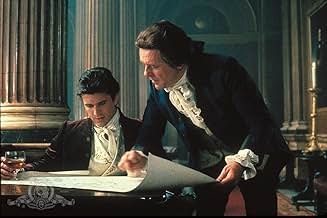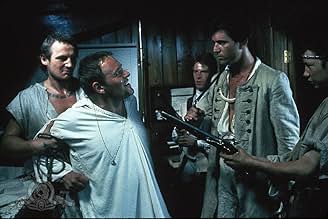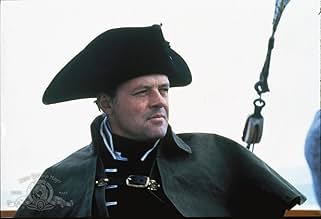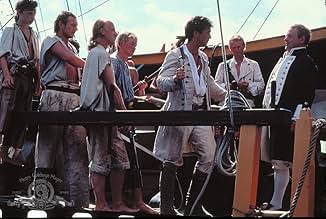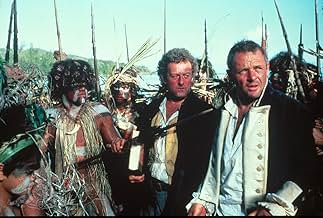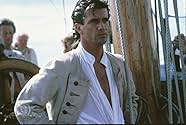Fed up with their Captain's harsh discipline, a sailing ship's crew decides to take action.Fed up with their Captain's harsh discipline, a sailing ship's crew decides to take action.Fed up with their Captain's harsh discipline, a sailing ship's crew decides to take action.
- Awards
- 2 nominations total
- Young
- (as Philip Davis)
- Director
- Writers
- All cast & crew
- Production, box office & more at IMDbPro
Storyline
Did you know
- TriviaMel Gibson was disappointed with his performance and the finished movie. He later said of the movie, "I think the main problem with that film was that it tried to be a fresh look at the dynamic of the mutiny situation, but didn't go far enough. In the old version, Captain Bligh was the bad guy and Fletcher Christian was the good guy. But really Fletcher Christian was a social climber and an opportunist. They should have made him the bad guy, which indeed he was. He ended up setting all these people adrift to die, without any real justification. Maybe he'd gone island crazy. They should have painted it that way. But they wanted to exonerate Captain Bligh while still having the dynamic where the guy was mutinying for the good of the crew. It didn't quite work."
- GoofsWhen Bligh, Fryer and Christian are in Bligh's home planning the voyage, Bligh refers to a route that would take them around the coast of 'Australia'. But at the time of the Bounty's voyage in 1789 what we now know as Australia was instead universally called New Holland - a name which also appears on Bligh's map and which he later uses after being cast adrift. 'Australia' only came into common usage in the early 19th century; it gained official status in 1824.
- Quotes
Lt. William Bligh: We are still faced with a long, hard voyage. I mean to make good use of every hour of sailing time, and to assist me in this, I am replacing Mr. Fryer with Mr. Christian, who will now act as executive second in command, with the rank of Acting Second Lieutenant...
[Fryer walks away]
Lt. William Bligh: Mr. Fryer, come back here.
[shouts after Mr. Fryer, who is continuing to walk away]
Lt. William Bligh: Mr. Fryer, sir! Come back here!
[Mr. Fryer returns; Bligh continues, quietly]
Lt. William Bligh: I will dismiss when I have done with you, sir. Do you hear me?
John Fryer: This is an outrage!
Lt. William Bligh: Mr. Fryer!
John Fryer: In all my years at sea...
Lt. William Bligh: Your "years at sea"? Good Lord, man! If I'd known your nature, I would not have accepted you as boatswain of a river barge.
John Fryer: Must I suffer this before the men?
Lt. William Bligh: You will suffer my correction whenever you're at fault, sir!
John Fryer: What fault?
Lt. William Bligh: [shouts] God damn your eyes, man! You turned your back on me!
John Fryer: Well for that, I apologize.
Lt. William Bligh: Very well.
John Fryer: But I protest.
Lt. William Bligh: You protest, do you?
John Fryer: I am Master of the Bounty!
Lt. William Bligh: [shouts] And I, sir, am *Commander*! By law! I am the first! Do you understand? God damn your hide! And now you may dismiss, sir!
- Alternate versionsGerman version misses ca. 26 minutes.
- ConnectionsFeatured in The Making of 'the Bounty' (1984)
There have been many film treatments of this amazing story, but only "The Bounty" gets it even halfway right. The 1935 Lawton/Gable "Mutiny on the Bounty" is 49% balderdash and 51% falsehood. The Trevor Howard/Marlon Bando stinker is even less factual. "The Bounty", however is pretty good history in many places, especially Bligh's court-martial and the actual mutiny sequence, which is almost word-for-word what Bligh recorded in his own writings on the matter. The ship itself is correctly represented, right down to the figurehead a woman in a blue riding habit, which makes no sense until one realizes that HMAV Bounty was originally a merchant ship called the Bethia.
The movie does take liberties with history. Some characters are composites and some important figures are absent entirely. In the plot Bligh seeks out Christian to be his second officer. In reality Christian was a friend of Bligh's wife's family, and it was he who sought a posting on Bounty; Bligh didn't solicit his participation. In fact Bligh jiggered the ship's roster to make room for Christian.
But the worst departure from fact is the business about Cape Horn and circumnavigation. The movie wants us to believe that Bligh chose the route for his own glory. Not true. Bligh complained to the Admiralty about the chosen course before they set sail from England, thinking it too dangerous for such a small vessel. But he was overruled. The return trip was never intended to go by way of Cape Horn. The cargo was breadfruit seedlings, a tropical plant that can't endure the kind of temperatures encountered in the Drake Passage or the Straits of Magellan. Bligh was forbidden to return via this route. Even if he wanted to such a course of action would have ruined his career. Also the mutiny occurred near Tofua, about 1300 miles west of Tahiti, the wrong direction to sail if you're bound for Cape Horn.
Bligh was a man and a professional. Christian was a silly, overwrought upper class schoolboy who committed a vile crime over puppy love of a Polynesian girl. He got away with attempted mass murder, and 200 years later people still praise him. Bligh was a true hero who hasn't got justice yet.
Details
- Release date
- Countries of origin
- Language
- Also known as
- The Lawbreakers
- Filming locations
- Moorea, French Polynesia(South Seas locations)
- Production companies
- See more company credits at IMDbPro
Box office
- Budget
- $25,000,000 (estimated)
- Gross US & Canada
- $8,613,462
- Opening weekend US & Canada
- $2,622,306
- May 6, 1984
- Gross worldwide
- $8,613,462
- Runtime2 hours 12 minutes
- Color
- Sound mix
- Aspect ratio
- 2.39 : 1
Contribute to this page



